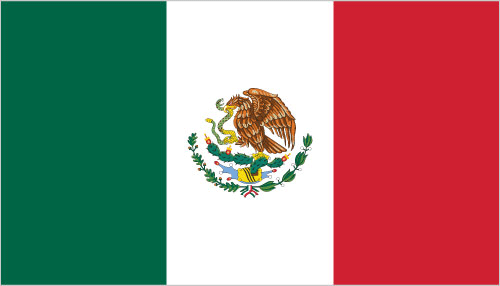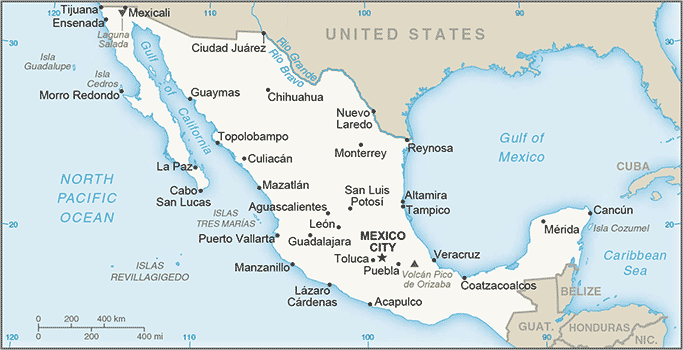Exporting to Mexico


Mexico Country Profile
Official Name (Local Language) Estados Unidos Mexicanos
Capital Mexico City
Population 123,166,749
Currency Mexican Peso
GDP $1,064 billion
Languages Spanish
Phone Dial In 52
Mexico Import Profile
Imports ($m USD) 420,369
Number of Import Products 4,450
Number of Import Partners 223

Mexico Economic Statistics
Government Website | https://en.presidencia.gob.mx/ |
| Sovereign Ratings | https://countryeconomy.com/ratings/mexico |
| Central Bank | Banco de Mexico |
| Currency USD Exchange Rate | 18.34 |
| Unemployment Rate | 43.619% |
| Population below poverty line | 46.2% |
| Inflation Rate | 2.8% |
| Prime Lending Rate | 6.25% |
| GDP | $1,064 billion |
| GDP Pro Capita (PPP) | $18,900 |
| Currency Name | Mexican Peso |
| Currency Code | MXN |
| World Bank Classification | Upper Middle Income |
| Competitive Industrial Performance | 51/138 |
| Corruption Perceptions Index | 135/180 |
| Ease of Doing Business | 54/190 |
| Enabling Trade Index | 51/136 |
Access trade, receivables and supply chain finance
We assist companies to access trade and receivables finance through our relationships with 270+ banks, funds and alternative finance houses.
Get StartedExporting to Mexico
Through the building of an extensive free trade network with more than 40 countries, Mexico has risen to the status of the second largest economy in Latin America. Currently ranked as the world’s fifteenth largest economy it is tipped by World Bank analysts to rise to fifth by 2050. Mexico’s imports are about $355 billion per annum with major imports being refined petroleum ($23.8 billion), vehicle parts ($20 billion), integrated circuits ($11 billion) and computers ($9.6 billion). Major import partners are the United States ($180 billion), China ($56 billion) and Japan ($14 billion).
Exporting to Mexico: What is trade finance?
Export finance is a revolving facility which alternative financiers offer – it enables SMEs to buy products and can help ease cash management. Often, a trade financier will fund up to 100% of the cost of the receivables, including charges (e.g. delivery costs). Trade finance offers added advantages over more traditional bank finance including asset finance or business loans. Trade finance provides up front funding without affecting existing bank relationships.
How does it work?
If you’re a firm importing or exporting stock around the world, then a trade finance facility would help you to fund this through offering a letter of credit or some form of cash advance.
I’m looking to export to Mexico, how can Trade Finance Global help, and how does it work?
If you are looking to export products to other countries, you may need export finance, which is a commercial agreement between you (the exporter), and the importer. A trade finance bank would advance you the cost of producing the products that you are exporting (as a debt product), either once you have shipped the goods, or before producing them. Once the importer has received the stock and pays you for the import, you will repay the advance from the export bank over an agreed period.
Chart Showing GDP Growth Compared to rest of world
GDP Composition for Mexico
Agriculture
3.7%
Corn, wheat, soybeans, rice, beans, cotton, coffee, fruit, tomatoes; beef, poultry, dairy products; wood products
Industry
33.1%
Food and beverages, tobacco, chemicals, iron and steel, petroleum, mining, textiles, clothing, motor vehicles, consumer durables, tourism
Services
63.2%
Map
Top 5 Import Partners
| Country | Trade | % Partner Share |
| United States | 194,992 | 46.39 |
| China | 74,145 | 17.64 |
| Japan | 18,185 | 4.33 |
| Germany | 16,421 | 3.91 |
| Korea, Rep. | 15,756 | 3.75 |
Top 5 Import Products
| Export Product | Number |
| Petroleum oils, etc, (excl. crude); preparation | 6.0% |
| Monolithic integrated circuits, nes | 5.9% |
| Automobiles with reciprocating piston engine di | 3.9% |
| Telegraphic apparatus, nes | 2.7% |
| Parts and accessories of automatic data process | 2.4% |
Local Partners
- All Topics
- Mexico Trade Resources
- Export Finance & ECA Topics
- Local Conferences



















